Grants for Church Heating Systems serve as vital financial lifelines for religious institutions grappling with the challenges of maintaining comfortable environments for their congregations, particularly during harsh weather conditions.
These grants play a pivotal role in addressing the pressing need for heating system upgrades or installations in churches, where outdated or inefficient systems can pose significant financial burdens and discomfort to worshippers.
The availability of such grants underscores a broader commitment to supporting community welfare and fostering a conducive environment for religious gatherings.
In this comprehensive exploration, we delve into the diverse landscape of grants aimed at enhancing heating infrastructure in churches, examining the range of funding opportunities, eligibility criteria, application processes, and the impact these grants have on the overall well-being of congregations.
What are the Grants For Church Heating Systems
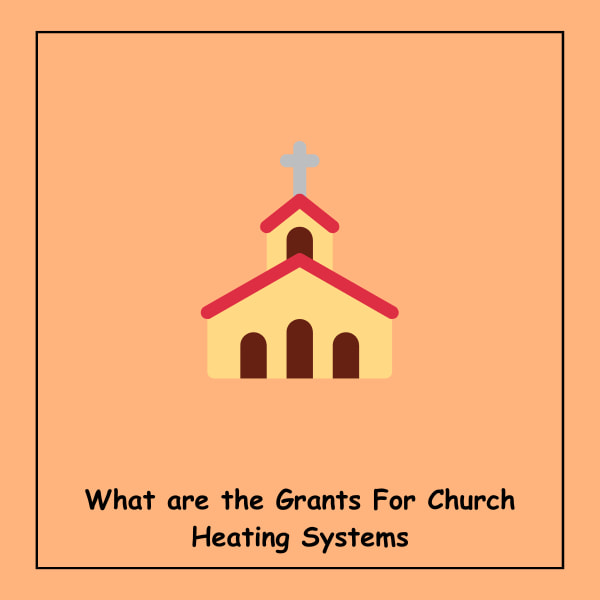
Grants for Church Heating Systems are integral components of financial support mechanisms tailored to address the unique needs of religious institutions in maintaining optimal heating conditions for their congregations.
These grants encompass a diverse array of funding opportunities, ranging from initiatives aimed at upgrading outdated heating systems to programs facilitating the installation of energy-efficient alternatives.
In essence, they serve as catalysts for ensuring the comfort, safety, and well-being of worshippers, particularly during colder seasons when inadequate heating infrastructure can present significant challenges.
Moreover, these grants often extend beyond mere financial assistance, providing churches with access to expertise, resources, and guidance necessary for implementing sustainable heating solutions.
By fostering partnerships between religious organizations and funding entities, grants for church heating systems contribute not only to enhancing physical infrastructure but also to strengthening community resilience and fostering a sense of belonging among congregants.
How to Get Grants For Church Heating Systems

Accessing Grants for Church Heating Systems involves navigating a structured process that encompasses several key steps aimed at maximizing the likelihood of securing funding. Below, we outline a comprehensive guide on how to obtain these grants:
- Research Grant Opportunities: Begin by conducting comprehensive research to identify a diverse range of grant opportunities available to support church heating systems. Explore various sources such as government agencies, nonprofit organizations, religious foundations, and community initiatives. Utilize online databases, grant directories, and networking opportunities to expand your list of potential funding sources.
- Understand Eligibility Requirements: Carefully review the eligibility criteria outlined by each grant provider to ensure that your church meets all necessary requirements. Common eligibility factors may include nonprofit status, religious affiliation, geographic location, size of congregation, financial need, and demonstrated commitment to energy efficiency and sustainability initiatives.
- Gather Necessary Documentation: Prepare a comprehensive set of documents to support your grant application. This may include financial statements, project proposals, detailed budgets, quotes from heating system vendors or contractors, letters of support from community stakeholders, evidence of past successful projects, and any other relevant materials requested by the grant provider.
- Develop a Compelling Proposal: Craft a persuasive grant proposal that clearly articulates the need for funding, outlines the proposed heating system project, demonstrates the anticipated impact on the congregation and community, and highlights the church’s capacity to effectively manage and sustain the project. Tailor your proposal to align with the mission and priorities of each grant program, emphasizing factors such as energy efficiency, environmental sustainability, community outreach, and social impact.
- Complete the Application Form: Fill out the grant application form accurately and thoroughly, ensuring that all required fields are completed and all supporting documents are properly attached. Pay close attention to formatting guidelines, word limits, and submission instructions provided by the grant provider. Consider seeking feedback from colleagues, mentors, or grant writing professionals to strengthen your application before submission.
- Submit the Application: Submit your completed grant application by the specified deadline, following the submission instructions provided by the grant provider. Keep a record of your submission confirmation and any correspondence related to your application. If applicable, consider sending a follow-up email or making a phone call to confirm receipt of your application and inquire about the timeline for review and notification of funding decisions.
- Follow-Up and Advocate: Maintain open communication with the grant provider throughout the review process, responding promptly to any requests for additional information or clarification. Be prepared to advocate for your project and address any questions or concerns raised by the grant reviewers. Provide updates on project milestones, engage with grant program staff, and demonstrate your organization’s commitment to accountability, transparency, and project success.
By following these steps and leveraging your organization’s strengths, resources, and community connections, you can enhance your chances of securing grants for church heating systems to support your mission and serve the needs of your congregation effectively.
Eligibility Criteria for Grants For Church Heating Systems
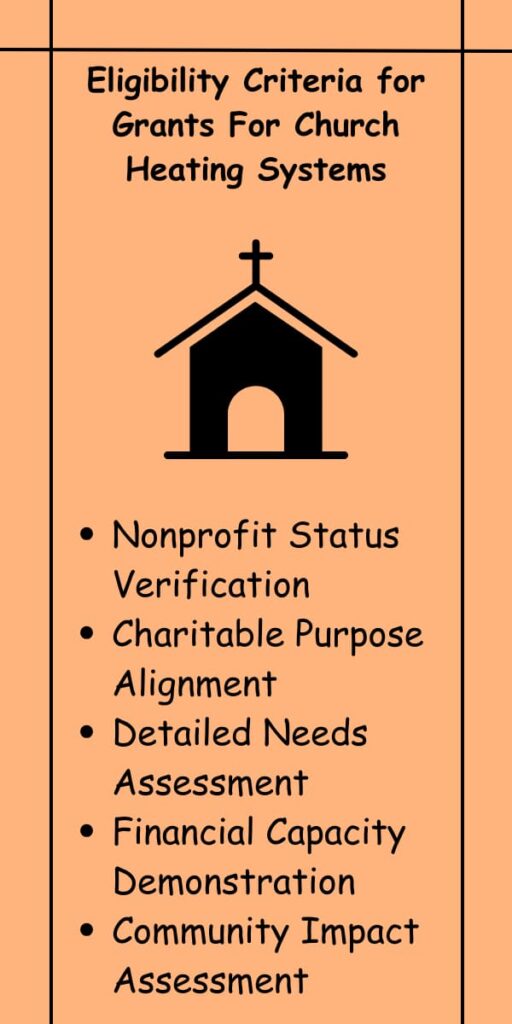
- Nonprofit Status Verification: Grant providers typically require churches to provide proof of their nonprofit status. This verification may include submitting a copy of the organization’s IRS determination letter or state-issued nonprofit certificate. It ensures that the church operates with a charitable purpose and is eligible to receive funding for heating system improvements.
- Charitable Purpose Alignment: Churches must demonstrate alignment with the charitable purpose of the grant provider. This involves showcasing how the proposed heating system project contributes to community welfare, supports vulnerable populations, or promotes environmental sustainability. Clear articulation of the church’s mission and its impact on the broader community strengthens the eligibility for heating system grants.
- Detailed Needs Assessment: A comprehensive needs assessment is crucial to establishing the church’s genuine need for heating system upgrades or installations. This assessment should include an evaluation of the current heating infrastructure, identification of deficiencies or inefficiencies, and an analysis of the impact on the congregation and community. Providing data-driven evidence of the need for improvement enhances the church’s eligibility for grant funding.
- Financial Capacity Demonstration: Grant applicants are often required to demonstrate their financial capacity to manage grant funds effectively. This may involve submitting audited financial statements, budget projections, and evidence of financial stability. Churches must show that they have the resources and capability to oversee the heating system project from inception to completion, ensuring accountability and transparency in fund utilization.
- Community Impact Assessment: Grant providers prioritize projects that have a positive impact on the broader community. Churches seeking heating system grants should assess the potential community benefits of the proposed project. This may include providing heating services to local organizations, offering emergency shelter during extreme weather events, or reducing energy consumption and greenhouse gas emissions. Demonstrating how the project benefits the community beyond the church congregation strengthens the church’s eligibility for grant funding.
Document Requirement for Grants For Church Heating Systems
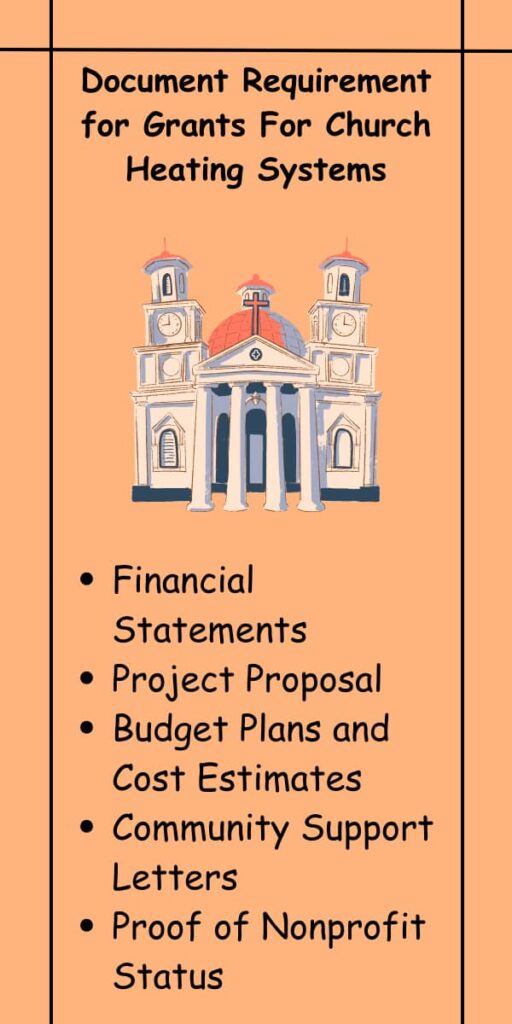
- Financial Statements: Churches must provide recent financial statements, including balance sheets, income statements, and cash flow statements. These documents offer insight into the church’s financial health, stability, and ability to manage grant funds responsibly.
- Project Proposal: A well-developed project proposal is essential for conveying the church’s heating system needs, proposed solutions, and anticipated outcomes. The proposal should outline the scope of work, project objectives, timeline, budget, and expected impact on the congregation and community. Clear and concise articulation of the project’s goals and benefits strengthens the church’s grant application.
- Budget Plans and Cost Estimates: Churches must prepare detailed budget plans outlining the projected costs associated with the heating system project. This includes expenses such as equipment purchase, installation, labor, permits, and contingency funds. Providing accurate cost estimates demonstrates fiscal responsibility and ensures that grant funds are allocated efficiently.
- Community Support Letters: Letters of support from community stakeholders, such as local government officials, business leaders, or nonprofit organizations, validate the church’s impact and strengthen the grant application. These letters should highlight the importance of the heating system project to the community and affirm the church’s positive contributions.
- Proof of Nonprofit Status: Churches must submit documentation verifying their nonprofit status, such as an IRS determination letter or state-issued nonprofit certificate. This documentation confirms the church’s eligibility to receive grant funding for heating system improvements and ensures compliance with grant requirements.
Application Process for Grants For Church Heating Systems
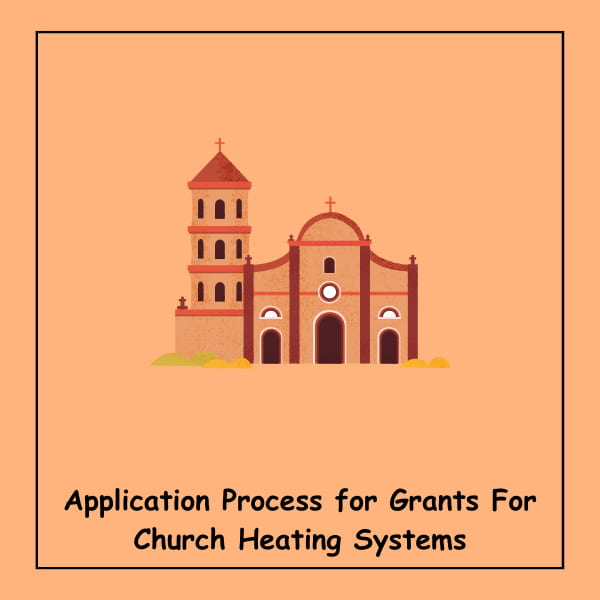
- Thorough Research: Begin by researching available grant opportunities from various sources, including government agencies, foundations, and nonprofit organizations. Evaluate each grant program’s eligibility criteria, funding priorities, and application deadlines to determine the best fit for your church’s needs.
- Review and Understand Eligibility Criteria: Carefully review the eligibility criteria outlined by each grant provider to ensure that your church meets all requirements. This may include nonprofit status verification, alignment with the grantor’s charitable purpose, and demonstrated need for heating system improvements.
- Engage Stakeholders and Gather Information: Involve key stakeholders in the grant application process and gather necessary information, such as financial statements, project plans, and community support letters. Collaborate with experts, consultants, or grant writing professionals to strengthen your application and address any potential gaps or challenges.
- Complete Application Form: Fill out the grant application form accurately and thoroughly, following all instructions provided by the grant provider. Provide clear and concise responses to each question and attach all required documents, ensuring compliance with formatting and submission requirements.
- Submit Application and Confirm Receipt: Submit your completed application by the specified deadline, either through an online portal or by mail, as indicated in the grant guidelines. Keep records of your submission confirmation and follow up with the grant provider to confirm receipt of your application.
- Stay Engaged and Responsive: Maintain open communication with the grant provider throughout the review process, responding promptly to any requests for additional information or clarification. Be proactive in addressing any concerns or questions raised by the grant reviewers, demonstrating your church’s commitment to transparency and accountability.
- Await Funding Decision: After submitting your application, await the funding decision from the grant provider. This may take several weeks or months, depending on the grant program’s review process and timeline. Use this time to stay informed about the status of your application and prepare for potential next steps.
- Implement Project and Manage Funds: If your grant application is approved, work with the grant provider to finalize any additional requirements and begin implementing the heating system project according to the proposed timeline and budget. Manage grant funds responsibly, keeping accurate records of expenses and reporting requirements.
- Report on Project Outcomes: Upon completion of the project, submit any required reports or documentation detailing the outcomes and impact of the heating system project on the church and the community to the grant provider. Highlight key achievements, challenges, and lessons learned, and express gratitude for the grant provider’s support.
What are the types of Heating Grants available to Churches?
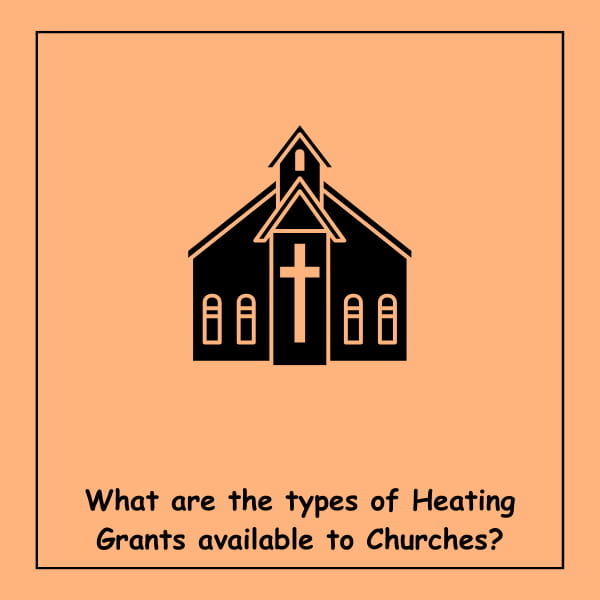
Heating Grants are diverse in nature, catering to the varying needs and priorities of churches seeking to improve their heating infrastructure. Below are several types of heating grants commonly available to churches:
- HVAC Grants for Churches: These grants focus specifically on Heating, Ventilation, and Air Conditioning (HVAC) systems. They aim to support churches in upgrading or installing HVAC systems to ensure optimal temperature control and air quality within their facilities. HVAC grants may cover expenses related to equipment purchase, installation, and maintenance.
- Energy Efficiency Grants for Churches: Energy efficiency grants prioritize initiatives that promote energy conservation and sustainability. In addition to heating system upgrades, these grants may fund projects such as insulation improvements, weatherization measures, and the adoption of renewable energy technologies. By enhancing energy efficiency, churches can reduce operating costs and minimize their environmental footprint.
- Renewable Energy Grants: Grants for renewable energy initiatives enable churches to transition to clean and sustainable heating solutions. Funding may be available for the installation of solar panels, geothermal heat pumps, biomass boilers, or other renewable energy systems. These grants support churches in reducing reliance on fossil fuels and mitigating greenhouse gas emissions.
- Weatherization Grants: Weatherization grants focus on improving the thermal efficiency of church buildings to reduce heating costs and enhance comfort. They may cover expenses associated with upgrading windows and doors, sealing air leaks, and adding insulation. Weatherization grants help churches optimize energy use and create more comfortable indoor environments for congregants.
- Historic Preservation Grants: Churches located in historic buildings may qualify for grants aimed at preserving their architectural integrity while addressing heating system needs. These grants support the restoration, repair, or replacement of heating infrastructure in accordance with historic preservation guidelines. By preserving their heritage, churches can maintain their historical significance while ensuring modern comfort for worshippers.
- Community Development Grants: Some heating grants are part of broader community development initiatives aimed at improving quality of life and addressing social disparities. These grants support projects that benefit both the church and the surrounding community, such as heating system upgrades in community centers or shelters. By investing in community development, churches can strengthen their ties to the neighborhoods they serve.
- Emergency Assistance Grants: Emergency assistance grants provide rapid funding to churches facing urgent heating system issues, such as equipment failure or weather-related damage. These grants help churches restore heating services quickly, ensuring the safety and well-being of congregants and community members during crises.
- Utility Rebate Programs: Utility companies offer rebate programs to incentivize energy-efficient upgrades, including heating system improvements. Churches may qualify for rebates or incentives for installing high-efficiency heating equipment or implementing energy-saving measures. Utility rebate programs help offset upfront costs and encourage churches to invest in energy-efficient solutions.
By exploring these diverse types of heating grants, churches can identify funding opportunities that align with their specific needs, goals, and priorities for improving heating infrastructure and enhancing overall facility efficiency.
List of Organizations that offer Grants for Church Heating
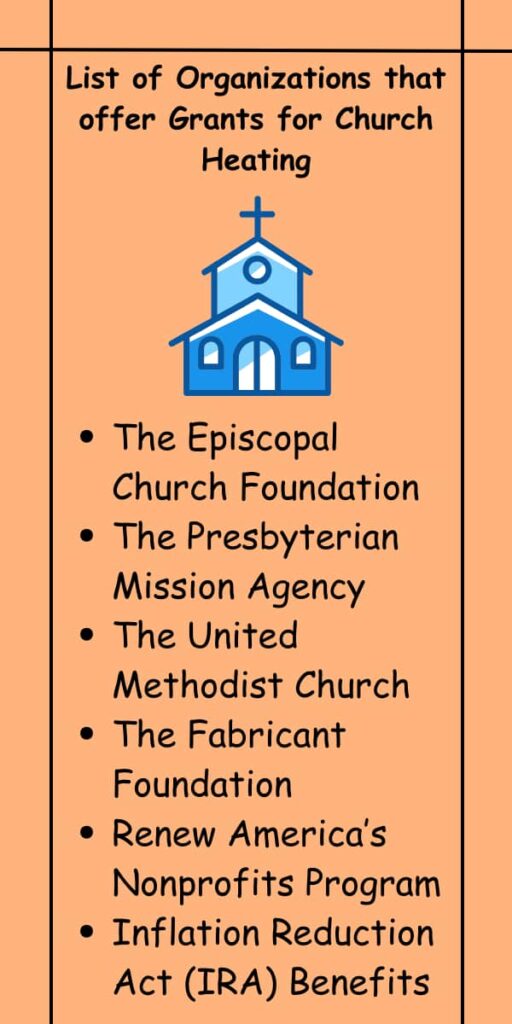
- The Episcopal Church Foundation: The Episcopal Church Foundation provides several grants to assist churches with heating system needs. Notable among them are the Church Heating and Cooling Grant and the Church Energy Efficiency Grant. These grants support the installation of new heating systems, restoration of existing systems, and acquisition of energy-efficient heating equipment. Churches affiliated with The Episcopal Church can apply for these grants to address their heating infrastructure requirements.
- The Presbyterian Mission Agency: The Presbyterian Mission Agency offers various grants to support churches in improving their heating systems. Among these are the Church Heating and Cooling Grant, Energy Efficiency Grant, and Home Repair Grant. These grants aim to alleviate heating costs, promote energy-efficient upgrades, and facilitate general repairs for churches affiliated with The Presbyterian Church.
- The United Methodist Church: The United Methodist Church provides grants such as the Carbon Fund Mini-Grant and the Sacred Spaces Grant to assist churches in financially disadvantaged communities. These grants offer support for energy-efficient improvements, including heating system upgrades, free energy assessments, and energy-efficient equipment acquisition. Churches in need of funding can apply for these grants to enhance their heating infrastructure.
- The Fabricant Foundation: The Fabricant Foundation focuses primarily on churches in New York City, offering grants for heating system projects, restoration, and replacement of historic church buildings. They provide both small grants and matching grants to help churches preserve their historical significance and ensure comfortable environments for congregants. Churches requiring new heating systems can explore funding opportunities provided by The Fabricant Foundation.
- Renew America’s Nonprofits Program: Administered by the Department of Energy and funded by the Infrastructure Investment and Jobs Act (IIJA), Renew America’s Nonprofits Program offers grants for church heating systems. With a dedicated allocation of $50 million over five years, this program provides significant financial support to churches in need of new heating systems. Churches seeking funding for heating infrastructure projects can apply for grants through this program.
- Inflation Reduction Act (IRA) Benefits: The Inflation Reduction Act (IRA) includes provisions offering clean energy tax credits and grants for efficiency upgrades, including heating systems, for nonprofits and houses of worship. This act simplifies access to clean energy funds and tax credits, making it easier for churches to implement energy-efficient heating solutions. Churches interested in accessing clean energy funds and tax credits for heating system upgrades can explore opportunities under the IRA.
Conclusion:
In conclusion, grants for church heating systems serve as invaluable resources for religious institutions seeking to enhance their heating infrastructure and provide comfortable environments for congregants.
Through the support of organizations such as The Episcopal Church Foundation, The Presbyterian Mission Agency, The United Methodist Church, The Fabricant Foundation, Renew America’s Nonprofits Program, and benefits under the Inflation Reduction Act (IRA), churches can access funding to address their heating needs.
By leveraging these grants, churches can improve energy efficiency, reduce heating costs, and ensure the well-being of their communities for years to come.
[the_ad id=”39205″]
Frequently Asked Questions (FAQ):
What Are Grants for Church Heating Systems?
Grants for church heating systems are financial assistance programs aimed at helping religious institutions upgrade or install heating infrastructure to maintain comfortable environments for their congregations, especially during colder seasons.
Who Provides Grants for Church Heating Systems?
Grants for church heating systems can be provided by various entities, including government agencies, nonprofit organizations, religious foundations, community initiatives, utility companies, and private donors.
What Types of Projects Do Heating System Grants Cover?
Heating system grants may cover a range of projects, including upgrading existing heating systems, installing new HVAC equipment, improving energy efficiency, adopting renewable energy technologies, weatherizing buildings, and addressing emergency heating system issues.
How Can My Church Qualify for Heating System Grants?
Eligibility criteria vary depending on the grant provider but commonly include nonprofit status verification, alignment with the grantor’s charitable purpose, demonstrated need for heating system improvements, financial capacity demonstration, and potential community impact.
What Documentation Is Required for Applying for Heating System Grants?
Documentation typically includes proof of nonprofit status, financial statements, project proposals, detailed budgets, cost estimates, community support letters, and any other materials requested by the grant provider.
How Can My Church Find Available Heating System Grants?
Researching online databases, grant directories, government agencies, nonprofit organizations, religious foundations, and networking opportunities can help identify available heating system grants.
What Is the Application Process for Heating System Grants?
The application process involves researching grant opportunities, understanding eligibility criteria, gathering necessary documentation, developing a compelling proposal, completing the application form, submitting the application, staying engaged with the grant provider, awaiting funding decisions, implementing the project, and reporting on outcomes.
Are There Specific Grants for Historic Churches?
Yes, some grants specifically target historic churches to preserve their architectural integrity while addressing heating system needs. These grants support the restoration, repair, or replacement of heating infrastructure in accordance with historic preservation guidelines.
Can Churches Receive Utility Rebates for Heating System Upgrades?
Yes, utility companies often offer rebate programs to incentivize energy-efficient upgrades, including heating system improvements. Churches may qualify for rebates or incentives for installing high-efficiency heating equipment or implementing energy-saving measures.
How Long Does It Take to Receive Funding After Applying for Heating System Grants?
The timeframe for receiving funding varies depending on the grant program’s review process and timeline. It may take several weeks or months to receive a funding decision after submitting the application.




